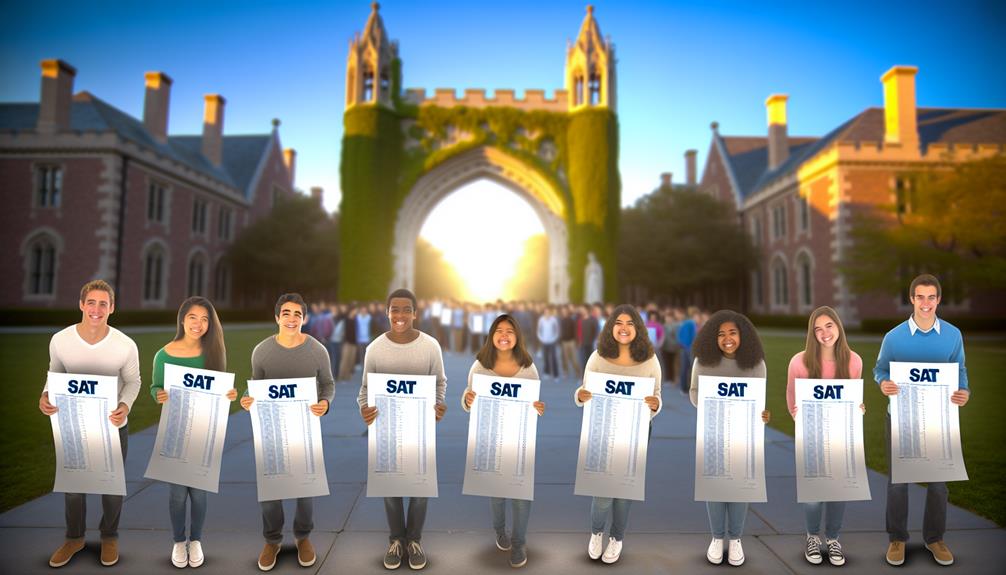Imagine standing at a fork in the road, one path leading to your dream college, and the other veering off into uncertainty; your SAT score is the compass guiding your way.
You've probably heard that these scores play a pivotal role in college admissions, but do you really know how they impact your journey?
In the intricate maze of college admissions, understanding the role of SAT scores can be your torch, illuminating your path. Let's unpack the significance of these scores, explore how colleges interpret them, and discover the hidden opportunities they might unlock for you.
But remember, the compass is only as useful as the hands that hold it. Are you ready to navigate your college journey with precision and confidence?
Understanding the SAT Scoring System
To truly get a handle on your college admission prospects, it's crucial that you grasp the SAT scoring system, a complex yet integral part of the application process. Scoring Rubric Decoding is your first step. The SAT, composed of two sections—Math and Evidence-Based Reading and Writing—each scored on a scale of 200 to 800. Thus, the total score ranges from 400 to 1600, with 1600 being the perfect score.
Now, let's delve into Test Prep Strategies. You've got to understand that the SAT doesn't penalize for wrong answers. So, don't hesitate to guess if you're unsure. Each correct answer adds points to your raw score, which is then converted into a scaled score. This conversion is what allows scores to be compared across different test dates.
Furthermore, the essay, optional, is scored separately. So, if you're confident about your writing prowess, it might provide that extra edge.
In essence, a deep understanding of the SAT scoring system can enhance your test prep strategies. It's not just about getting high scores, but understanding the system can help you target your efforts more effectively, increasing your chances of college admission success.
Importance of SAT Scores in Admissions
Understanding the weight of SAT scores in the college admissions process can dramatically shape your preparation strategy and ultimately, your success. Why? Because these scores aren't just numbers; they're a measure of your readiness for college-level work. They're instrumental in showing colleges how you stack up against other applicants.
Test Preparation Strategies are key to boosting your SAT scores. They're not just about memorizing facts, but also about learning to think critically, manage time effectively, and reduce test anxiety. By employing these strategies, you're more likely to improve your performance, thereby enhancing your chances of admission.
However, don't underestimate the importance of Alternate Admission Criteria. While a high SAT score can open doors, a less-than-stellar score doesn't necessarily close them. Colleges consider other factors like your GPA, extracurricular activities, leadership roles, and personal essays. These elements can paint a fuller picture of your potential as a student and person.
Comparing SAT Scores Among Colleges
While your individual SAT score is a key factor in admissions, it's also critical to consider how your score compares to those typically accepted at your target colleges. Not all colleges have the same SAT score ranges for admission, leading to score disparities. For instance, Ivy League schools generally require higher SAT scores than state universities.
Understanding these disparities can help you set realistic goals and plan your college application strategy. If your score is lower than the typical range for a particular college, it doesn't mean you're out of the running, but it does mean you'll need to strengthen other parts of your application. Conversely, if your score is higher than the average at a certain college, you might've a stronger chance of admission, but it's not a guarantee.
At the same time, be aware of potential admission bias. Some colleges may place more weight on SAT scores than others, potentially disadvantaging students who don't test well. Always research each college's admission policies to understand how they use SAT scores in their decision-making process.
High SAT Scores and Scholarship Opportunities
Achieving high SAT scores can open the door to numerous scholarship opportunities, potentially easing your financial burden for college. As you navigate the intricate process of college admission, it's essential to understand the role of SAT scores in determining scholarship eligibility.
Many scholarships have minimum SAT score requirements. Falling within a high score range can make you a strong candidate, increasing your chances of securing financial aid. This is particularly true for merit-based scholarships, where performance metrics like SAT scores play a significant role in the selection process.
Moreover, a high SAT score can also influence financial aid considerations indirectly. Colleges often use these scores to identify academically talented students. If you're amongst the top scorers, you may be offered generous aid packages, which can include a combination of grants, work-study opportunities, and loans.
Impact of SAT Scores on Major Selection
Beyond scholarship opportunities and financial aid considerations, your SAT scores can significantly influence your choice of major in college. This influence often stems from 'Major Specific SAT Requirements'.
For instance, STEM programs typically require higher Math scores, while Humanities programs may prioritize Evidence-Based Reading and Writing scores.
It's also worth noting the 'SAT Influence on Major Changes'. Your initial choice of major might be based on your passion or high school performance, but low SAT scores in related sections may lead you to reconsider.
For example, if you've always wanted to major in English but your Reading score is below par, you might be compelled to switch to a less reading-intensive major.
However, remember that while SAT scores are important, they're not the only factor in your academic journey. High scores can open doors, but they don't determine your ability to succeed in a particular field. Your dedication, curiosity, and willingness to learn are equally significant.
Role of SAT in Holistic Admission Approach
In the realm of college admissions, your SAT scores play a pivotal role in a holistic admission approach, where institutions evaluate not just your academic abilities, but also your personal qualities and extracurricular achievements. This approach goes beyond simple numbers, considering the whole of your potential as a student.
SAT preparation, therefore, becomes more than just mastering the academic content. It's about showcasing your dedication, discipline, and resilience, characteristics that colleges highly regard. The rigorous test preparation process demonstrates your commitment to academic success, which can translate to your future performance in college.
However, test anxiety is a common issue that can potentially affect your SAT performance. It's important to recognize and address it early on. Colleges understand this, and many are willing to consider other aspects of your application if your scores aren't as high as you'd like them to be.
That being said, don't underestimate the weight of your SAT scores. They're an integral part of the admission process, providing a standardized measure of academic aptitude. But remember, they're not the sole determinant of your acceptance. Your personal qualities and achievements also play a significant role in the decision-making process.
Improving Your SAT Scores for College
While it's clear your SAT scores aren't the only factor in college admissions, they're still crucial, and addressing ways to improve them could significantly boost your prospects. Developing test preparation strategies is essential in this endeavor.
Start by identifying your strengths and weaknesses through practice tests. This not only familiarizes you with the test format but also highlights areas that need improvement.
Next, focus on enhancing your knowledge in these areas. You might want to consider hiring a tutor, joining a study group, or using online resources. Consistent practice is key, so make sure you're dedicating enough time each week to study.
Remember, it's not always about studying harder but studying smarter. This is where score interpretation tips come in. Understanding the scoring system allows you to strategize effectively. For instance, since there's no penalty for wrong answers, it's better to guess than to leave a question blank.
Finally, taking care of your mental and physical health during this period can't be overstated. A well-rested, well-nourished body fosters a sharp mind.
With the right approach, you can improve your SAT scores and strengthen your college application.
Case Studies: SAT Scores and College Success
Diving into real-life scenarios, let's explore how SAT scores have played a pivotal role in shaping college success stories. It's essential to understand that score interpretation and test preparation can significantly impact your college journey.
Take the case of Sarah, a high school senior who invested heavily in test preparation. She enrolled in a course, dedicated hours to self-study, and took numerous practice tests. Her effort resulted in a high SAT score, which not only earned her admission into a prestigious university but also a substantial scholarship.
Then, there's John. He didn't score as high but interpreted his score correctly. He realized he'd done exceptionally well in Math but was lacking in English. Instead of aiming for colleges that wouldn't appreciate his skills, he applied to technical universities. Today, he's a successful engineer.
Both cases illustrate the importance of SAT scores, but they also highlight the significance of test preparation and score interpretation. Your SAT score isn't just a number; it's a tool that, when used correctly, can guide your college admission strategy and ultimately your career trajectory.
Conclusion
In sum, SAT scores play a vital role in college admissions, often influencing scholarship opportunities and major selection. Different colleges have varying SAT score expectations, yet all value these scores in their holistic admission approach.
Improving your SAT scores can bolster your chances of college success. So, it's beneficial to understand how this system works and strategize accordingly.
Remember, your SAT score isn't everything, but it's a significant piece of your college admission puzzle.








